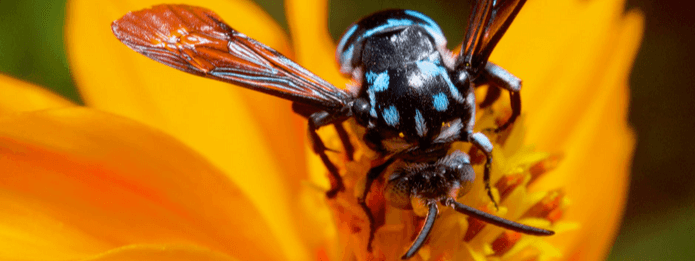
You might not like this, but wasps are an important part of our ecosystem and their disappearance would bring about some grave consequences. Wasps are pollinators, and despite their persistent need for wasp control during the warmer months of the year, they play a vital role in pollination. There are countless campaigns to save the bumblebee, so why not the wasp? It’s hard to imagine protecting them after they’ve destroyed another picnic, panicked another victim.
In today’s article, we’re going to look at some of the benefits that wasps bring us, such as pollinating plants. Wasps are often viewed in a negative light, but today we’re going to look at some of the positive aspects of their activity. And, by the end of this article, you’ll know that if you ever end up with a wasp control issue, then Truly Nolen are the pest control experts to call.
What Benefits Do Wasps Bring?
The vast majority of flowering plants depend on pollinators to germinate and spread their pollen to another plant. In fact, around 75% of all flowering plants require pollinators of some sort.
When we think of pollinators, naturally we think of bees. Bees patiently work their way between flowers, coating their fur in pollen and cross-contaminating with the next flower they visit. But as well as bees, you’ll perhaps be surprised to learn that flies, beetles, butterflies, moths and yes, even wasps also pollinate flowering plants.
Wasps are actually decorated in tiny hairs. This may not be as obvious as it is on say butterflies or bees, but wasp hairs also attract pollen when they collect nectar from a flowering plant. When they visit the next plant, that pollen is transferred. Bees are often heralded as the single most important pollinating insect, but other bugs, including wasps, play a crucial role.
So crucial, in fact, that some fruits and flowers wouldn’t exist at all without the wasp. One classic example is between the fig and the fig wasp. These two rely on one another so heavily that if fig wasps were for some reason to disappear, the fig fruit would disappear altogether. Figs also heavily support the diet of birds and other mammals. Remove fig wasps and there could be telling consequences.
Wasps as Predators
But wasps aren’t only effective as pollinators. Sitting at the top of many insect food chains, wasps can be particularly useful in your garden. So much so, that some gardeners actively encourage certain species of wasps to populate their garden.
There are more than 30,000 species of wasp identified so far, and the ones you’re likely to associate with painful stings are just a few of the very many wasps that could be on your property. Some of them will live their whole lives unnoticed. Predatory wasps, for example, are difficult to find and common in the garden. They plant eggs within caterpillars and grubs and control their populations effectively.
Other species of wasps will eat spiders, caterpillars, ants, and flies. It may not sound like much, but some of those insects can have a destructive influence in any garden. Caterpillars, in particular, can interfere with gardener’s products almost overnight – wasps help to control their population.
Truly Nolen & Wasp Control
So, it may pain you to admit it, but there are several advantages of having wasps in our world. They pollinate and control other pest populations. That being said, you still don’t want to find a wasp nest on your property, or even worse, in your attic.
If you do, be sure to contact our Truly Nolen team. We understand wasps better than anybody else, and we’ll know how to safely and effectively remove them from your home.